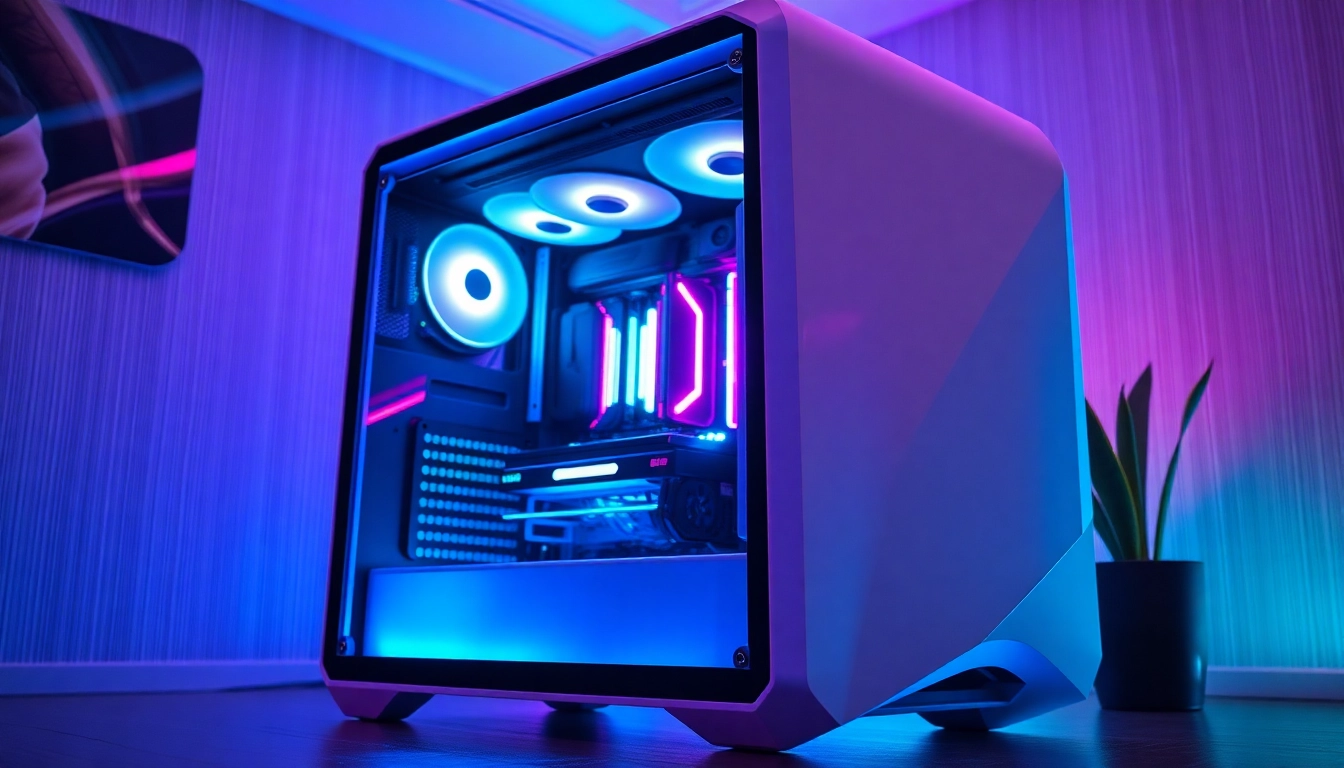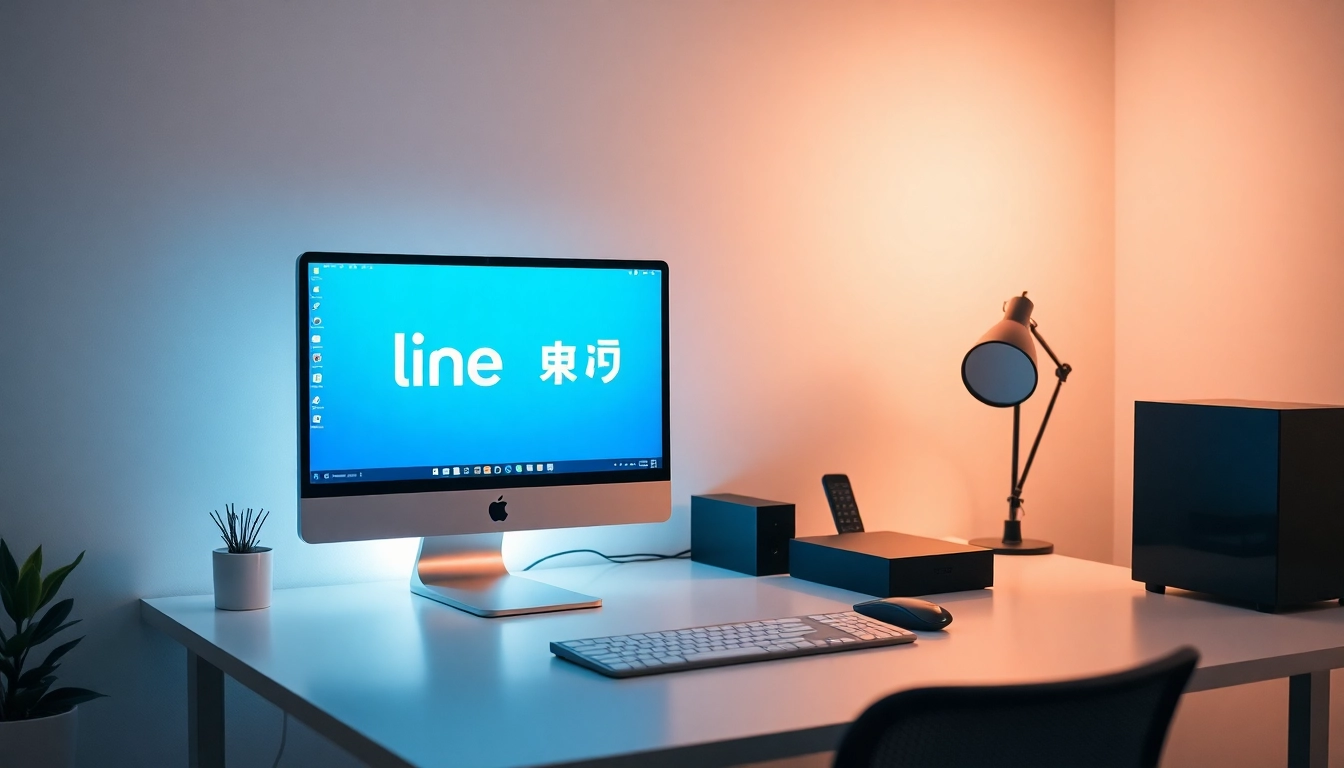Understanding Custom Gaming PC Cases
In the ever-evolving world of gaming, the aesthetics and functionality of hardware can significantly influence a player’s experience. One integral component that often goes overlooked is the custom gaming pc case, which serves as the backbone of any gaming setup. From housing crucial components to showcasing personal style, custom cases play a vital role in both performance and visual appeal. This article explores the intricacies of custom gaming PC cases, highlighting what they are, the benefits of personalized designs, and factors to consider when selecting the right case for your needs.
What is a Custom Gaming PC Case?
A custom gaming PC case is a tailored enclosure designed to fit specific hardware components while reflecting the owner’s unique aesthetics. Unlike standard PC cases, custom options offer a higher degree of personalization, allowing users to select dimensions, materials, colors, cooling systems, and even artwork. These cases are often designed for optimal airflow and efficient cable management while ensuring that all components are securely housed and aesthetically integrated.
The customization process can range from simple modifications, such as paint jobs or decals, to complex designs that include unique geometries or bespoke cooling solutions. This level of personalization is particularly appealing to gamers who wish to express their individuality through their setups.
Benefits of Customized Designs
Choosing a custom gaming PC case comes with numerous benefits:
- Personalization: Tailoring your case allows you to create a PC that reflects your personality and preferences, whether it’s a sleek, minimalist look or a loud, vibrant aesthetic.
- Enhanced Cooling: Custom cases can be designed with specific airflow patterns in mind, ensuring that components stay cool during demanding gaming sessions.
- Improved Cable Management: Custom enclosures often feature better organization options, which can enhance the overall appearance and maintain airflow efficiency.
- Exclusivity: Owning a custom design can set your rig apart from the crowd, providing a sense of pride and ownership over a truly unique machine.
- Durability and Future-Proofing: By selecting high-quality materials and components tailored to your needs, custom cases can offer increased durability and adaptability for future upgrades.
Key Features to Consider
When choosing a custom gaming PC case, several key features should influence your decision:
- Size: Ensure the case is compatible with the size of your motherboard (e.g., ATX, Micro-ATX, ITX) and has enough space for GPU and other components.
- Cooling Solutions: Look for options that accommodate various cooling setups, including air and liquid cooling. The positioning of fans and radiators can greatly impact thermal performance.
- Material: Common materials include steel, aluminum, acrylic, and tempered glass. Choose one that fits your aesthetic preferences and offers sufficient durability.
- Expandability: Seek a case that provides ample room for future upgrades, including more storage, additional cooling systems, or RGB lighting enhancements.
- Cable Management Options: A well-designed case should have features that simplify cable management, which is crucial for a tidy build and optimal airflow.
- Accessibility: Consider how easy it is to access components for upgrades or maintenance, including drive bays and cooling systems.
Choosing the Right Design for Your Needs
Once you’ve established the basics of what a custom gaming PC case entails, the next step is deciding on the design that best meets your needs. This process can be broken into several factors, including preference, compatibility, and future aspirations.
Differentiating Types of Custom Gaming PC Cases
Several types of custom gaming PC cases cater to varying gaming setups and preferences:
- ATX Cases: Designed for standard high-performance systems, ATX cases can accommodate large motherboards and multiple graphics cards, perfect for gamers seeking maximum performance.
- Micro-ATX Cases: Ideal for mid-range setups, these cases offer a balance of space for components while remaining compact enough for small gaming environments.
- Mini-ITX Cases: For gamers looking to build a compact or portable system, mini-ITX cases are lightweight yet can still effectively house powerful components with the right design.
- Full Tower Cases: These provide extensive space and airflow, often featuring multiple cooling options and extensive expandability, suitable for high-end gaming rigs.
- Custom-Shaped Cases: Beyond standard shapes, some companies offer uniquely shaped designs that can enhance visual appeal and fit specific aesthetics or thematic builds.
How Aesthetics Impact Performance
While the primary purpose of a gaming PC case is to house and protect components, its aesthetics can significantly affect its performance. An attractive case can inspire gamers and designers to invest more time and resources into their systems, resulting in better overall builds. Moreover, customized designs can lead to improved cooling capabilities, particularly when they are tailored to maximize airflow through the case.
Visual elements, such as RGB lighting or themed paint jobs, can also spark enthusiasm among gamers, encouraging them to enhance their overall performance through psychological motivation. A visually appealing setup may not improve FPS, but it can boost engagement and excitement, creating a more enjoyable gaming experience.
Popular Trends in Custom PC Case Designs
The landscape of custom PC case designs is continuously changing, driven by technological advancements and the evolving preferences of gamers. Here are some current trends gaining traction:
- Transparent Cases: Cases with tempered glass panels allow gamers to showcase their internal components and color schemes, creating a visually striking effect.
- Minimalist Designs: Sleek, clean lines and a focus on understated elegance are becoming increasingly popular, offering an appealing alternative to flashier designs.
- Eco-Friendly Materials: As sustainability becomes a priority downstream, manufacturers are exploring options for incorporating recycled materials in their designs.
- Modular Designs: Custom cases that offer modular components allow users to swap out parts easily or upgrade specific elements without needing to rebuild the entire system.
- RGB Integration: Custom cases with integrated RGB lighting are in high demand. Users love personalizing their lighting schemes to match their unique aesthetics and preferences.
DIY vs Professional Services: What’s Best?
When considering a custom gaming PC case, deciding between a DIY approach and enlisting professional services is crucial. Each option carries its own set of advantages and drawbacks.
Pros and Cons of Building Your Own Case
Building your own case offers a great sense of achievement and customization:
Pros:
- Full Control: You can design every aspect according to your preferences, ensuring every detail aligns with your vision.
- Cost Efficiency: DIY builds may be more economical, especially if you have the necessary tools and skills.
- Learning Experience: Constructing your own case enhances your understanding of PC components and their functions.
Cons:
- Time-Consuming: Building a case from scratch requires significant time, which may not be appealing for every gamer.
- Complexity: If you lack experience, designing a truly effective custom case can be complex, leading to potential pitfalls or mistakes.
- Limited Resources: Access to specific materials and fabrication techniques can be limiting without the right tools or experience.
Reputable Services for Custom Design
If you prefer focusing on gaming rather than building, various reputable services specialize in custom case designs:
- HYTE: Notable for their aesthetic designs and functional layouts, they offer both standard and custom solutions aimed at gamers.
- Vyral: Known for providing unique and personalized graphics, their custom printing options allow for creative expression.
- Starforge Systems: They provide high-quality, durable custom cases, with an emphasis on personalization and performance.
- Origin PC: They focus on high-end custom cases and offer laser etching services for those looking to add a professional touch.
Comparing Costs Between Options
Cost is often a deciding factor in whether to go DIY or seek professional services. A DIY approach may cost less if you already have some materials and tools but may still involve unforeseen expenses if you’re not experienced. Conversely, custom services usually mean higher upfront costs, but they guarantee quality and expertise from professionals who understand the intricate requirements for effective design and performance.
Ultimately, your budget, skills, and necessity for a personalized touch will guide your decision-making process.
Step-by-Step Guide to Creating Your Custom Gaming PC Case
For those who choose the DIY route, the following guide outlines a step-by-step approach to creating your own custom gaming PC case:
Gather Necessary Tools and Materials
The success of constructing your own case hinges upon having the right tools and materials. Essential items typically include:
- Tools: A drill, saw (jigsaw or Dremel), screwdriver set, measuring tape, and possibly a soldering iron.
- Materials: Steel, aluminum, acrylic, tempered glass, or wood, depending on your design preferences.
- Fasteners: Screws, nuts, and bolts are vital for securing various components and panels.
Designing and Prototyping Your Case
Once your materials and tools are in hand, the next stage is designing your case:
- Sketch Your Idea: Draft a design that outlines dimensions, panel placements, and airflow requirements. Consider inserting placeholder components to visualize the layout better.
- Digitize Your Design: Use CAD (Computer-Aided Design) software to create a more precise version of your sketch. Software can help identify if components fit together before cutting materials.
- Prototype: Before committing to final cuts, prototype your design using cardboard or inexpensive materials. This step allows you to ensure measurements and airflow are correctly planned.
Assembling and Testing Your Build
Once your design is finalized, you can begin constructing your case:
- Cutting the Materials: Use your saw to make precise cuts based on your design, ensuring safety protocols are followed.
- Assembly: Start putting together the outer panels first, then install interior components like drive bays and fan mounts.
- Testing: Once assembled, install your components and test the setup. Monitor temperatures and airflow during normal operation to ensure everything is functioning properly.
Throughout this process, remember to document your build with images or notes; these can be valuable for future modifications or repairs.
Enhancing the Longevity of Your Custom Gaming PC Case
With your custom gaming PC case complete, the focus shifts to maintaining its performance and ensuring durability over time. Proper care can enhance the lifespan of your setup and maximize operational efficiency.
Maintenance Tips for Peak Performance
Regular maintenance is essential to keeping your custom gaming PC case functioning well:
- Clean Regularly: Dust can accumulate quickly, impacting airflow. Regularly clean filters, fans, and vents to maintain optimal conditions.
- Monitor Temperatures: Use software to track temperatures during gaming. Ensure that your cooling systems are functioning correctly and adjust as necessary.
- Replace Worn Components: If your case features easily replaceable parts, such as a power supply or fans, keep an eye on their performance and replace them proactively.
Upgrades and Modifications Post-Build
The gaming industry is consistently evolving, and so too are the components that make up your PC. Additionally, gaming needs change over time. Consider potential upgrades that may stem from advancements in game design or personal preferences:
- GPU and CPU Upgrades: Newer graphics cards or processors can considerably improve performance. Make sure your case allows for these types of upgrades.
- Cooling System Enhancements: Explore advanced cooling solutions such as liquid cooling kits or improved fans if temperatures become a concern.
- USB Ports and Connectivity Options: Add additional ports or connectivity options to enhance versatility.
Community Resources for Ongoing Support
Engaging with the gaming and PC building community can provide invaluable insights and tips for maintaining and improving your custom gaming case. Consider participating in online forums, social media groups, or local meetups, where advice can be shared, and collaborative projects can emerge. Resources such as Discord servers, Reddit, or dedicated PC building websites can serve as platforms for discussion and support.
In conclusion, creating and maintaining a custom gaming PC case can significantly contribute to both performance and personal expression. By understanding the options available, utilizing DIY techniques effectively, or seeking professional assistance, every gamer can achieve a personalized setup that meets their gaming needs. Continued engagement with the community and staying abreast of technological advancements will ensure your custom case remains a formidable component in your gaming arsenal for years to come.


